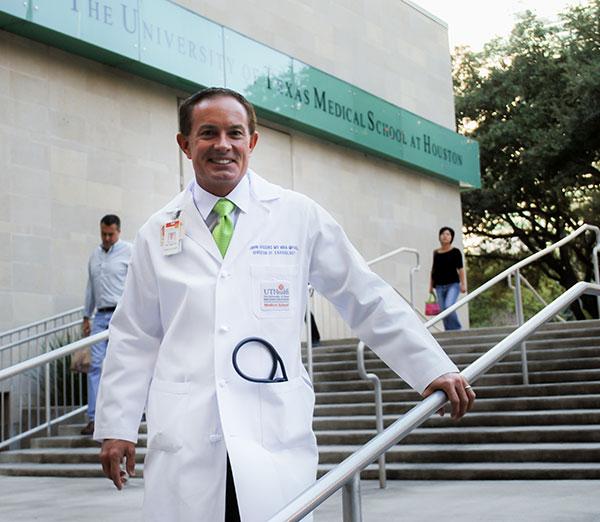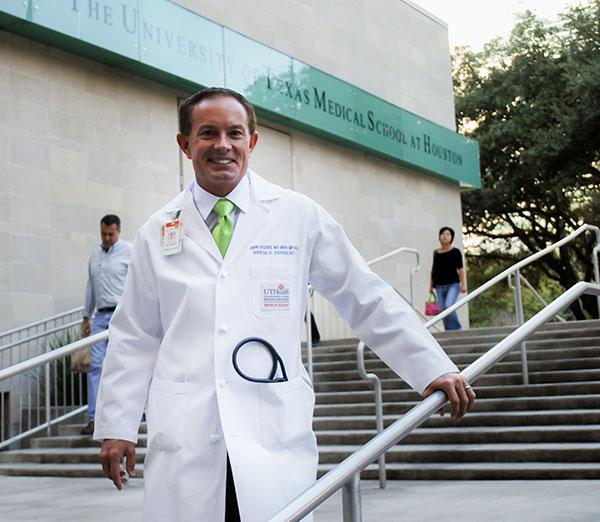
Credit: UTHealth
Helpful guidance and warnings regarding the potential dangers that energy drinks present to at-risk populations, primarily children, were published in a paper led by a cardiologist at The University of Texas Health Science Center at Houston (UTHealth) for the American College of Sports Medicine (ACSM).
"Energy drinks are extremely popular and concerns about their consumption are coming from every sector of society, which is why we've published these recommendations," said John Higgins, M.D., corresponding author and professor of cardiology at McGovern Medical School at UTHealth. "Our review of the available science showed that excessive levels of caffeine found in energy drinks can have adverse effects on cardiovascular, neurological, gastrointestinal, renal and endocrine systems, as well as psychiatric symptoms. More needs to be done to protect children and adolescents, as well as adults with cardiovascular or other medical conditions."
The official paper from the ACSM regarding energy drinks was published in the college's clinical review journal, Current Sports Medicine Reports.
Energy drinks are highly caffeinated beverages that often contain a myriad of vitamins, minerals, amino acids and herbal mixtures. ACMS, the largest sports medicine and exercise science organization in the world, published the new recommendations to help consumers understand the risks associated with rapid and excessive consumption of energy drinks.
"When used safely and with moderation, energy drinks may have some short-term, performance-enhancing effects. However, users are generally unaware of the many potential adverse reactions that could have long-term effects, some of which are quite serious," Higgins said. "We highly encourage consumers, parents, physicians, athletic trainers, personal trainers and coaches to follow these recommendations."
According to its press release, ACSM's primary recommendations in the paper focus on four key areas:
- Protecting children at risk: Children and adolescents appear to be at particularly high risk of complications from energy drinks due to their small body size, being relatively caffeine naive, and potentially heavy and frequent consumption patterns, as well as the amounts of caffeine. The message that these beverages are not intended for children needs to be re-enforced and widely disseminated, according to the article.
- Marketing to at-risk groups, especially children: Marketing should not appeal to vulnerable populations. Currently, manufacturers of energy drinks advertise on websites, social media and television channels that are appealing to both children and adolescents. Target marketing to sporting and other events involving children and adolescents should not be permitted.
- Do not use energy drinks before/during/after strenuous exercise: Regardless of health and fitness level, and until such time that proper safety and efficacy data are available, energy drinks should be avoided before, during or after strenuous activities. Some of the deaths allegedly due to energy drinks have occurred when a person consumed energy drinks before and/or after performing strenuous activities.
- More education and data needed: Investment in awareness and educational resources highlighting the potential adverse effects and safe use of energy drinks is required. Significant efforts should be made to educate consumers regarding the clear and present differences between soda, coffee, sports drinks and energy drinks. Energy drink education also should be a priority in school-based curricula related to nutrition, health and wellness.
The ACMS paper called for the development of a research agenda to prioritize key questions about the acute and chronic effects of energy drink use. The organization encouraged health care providers to talk to their patients about energy drink use and report adverse events to watchdog agencies, such as the Poison Control Centers, Consumer Product Safety Commission and the Food and Drug Administration. According to the paper, ahig national registry should be set up to specifically track energy-drink side effects with mandated reporting requirements.
The paper also recommended that children, adolescents or other vulnerable populations, including pregnant or breastfeeding women, should not consume energy drinks. Individuals with cardiovascular or medical conditions should not drink them. They should not be used for sports hydration or mixed with alcohol and should carry labels such as "High Source of Caffeine" or "Do Not Mix with Alcohol."
###
About ACSM:
The American College of Sports Medicine is the largest sports medicine and exercise science organization in the world. More than 50,000 international, national and regional members and certified professionals are dedicated to advancing and integrating scientific research to provide educational and practical applications of exercise science and sports medicine.
Media Contact
Rob Cahill
[email protected]
713-500-3030
http://www.uthouston.edu





